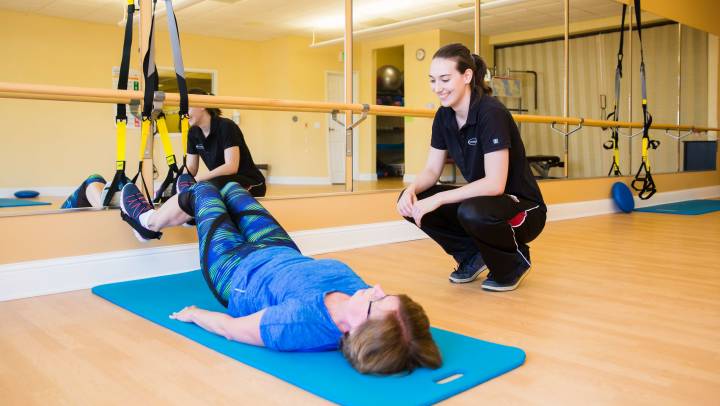Caring for a loved one is one of the most selfless and rewarding acts a person can do. However, it can also be physically, emotionally, and mentally demanding. Many caregivers find themselves so focused on meeting the needs of others that they neglect their own well-being. But self-care isn’t selfish—it’s essential. Prioritizing your health and well-being allows you to be a stronger, more present caregiver while maintaining your own sense of balance and fulfillment.
At Touchmark, we understand the challenges caregivers face, which is why we emphasize the importance of self-care, social connection, and stress management. Here are some practical ways caregivers can prioritize their well-being from our very own Jennifer Short, Touchmark at Fairway Village Health & Fitness Director. You can also watch her talking about this topic on a recent KATU segment.
1. Cultivate Self-Compassion
The foundation of self-care starts with self-compassion. Caregiving can be overwhelming, and it’s easy to feel guilt or frustration when things don’t go as planned. Be kind to yourself, acknowledge your efforts, and recognize that you are doing your best. Treat yourself with the same patience and understanding that you offer your loved one.
2. Incorporate Mindful Relaxation
One of the simplest ways to reduce stress and promote relaxation is through mindful breathing. Practicing breath awareness for just 10 minutes a day can help you reset, regain focus, and manage daily challenges with greater ease. Deep breathing techniques and meditation can bring a sense of calm to even the most hectic of days.
3. Stay Socially Connected
Caregiving can be incredibly time-consuming, and many caregivers struggle to maintain their social connections. However, staying engaged with friends, family, and support networks is crucial for mental and emotional well-being.
-
Prioritize social interactions, even if it’s just a quick coffee with a friend or a video call.
-
Participate in community activities and events. Touchmark hosts various social opportunities that encourage both residents and families to connect, but there are likely also additional public groups in your local area.
4. Make Time for Physical Wellness
Regular physical activity reduces stress, boosts energy, and improves overall health. Finding time to exercise can be challenging, but small changes can make a difference.
-
Join a group fitness class that fits your schedule. Many Touchmark communities offer wellness programs and fitness classes for those who are 50+ and need flexibility in their schedule.
-
Take 15 minutes to walk in your neighborhood, stretch, or practice yoga. Combine the benefits of exercise and the great outdoors by doing these outside when possible.
-
Exercise can also be a great way to connect with others who are in similar caregiving roles. For example, is your neighbor also caring for someone? Coordinate a morning or two per week when a third person can be with your loved ones while you get moving together and share your experiences.
5. Join a Caregiver Support Group
One of the most effective ways to prevent burnout is joining a support group. Caregiver groups provide a safe space to share experiences, seek advice, and connect with others who understand the unique challenges of caregiving.
Having a community of support can ease the emotional toll of caregiving while providing valuable insights and encouragement.
6. Accept Help and Delegate Tasks
Caregiving does not have to be a one-person job. Accepting help from friends, family, or professional caregivers can allow you to create more time for yourself. Small delegations, such as asking a friend to run an errand for you, mow your lawn, or sit with your loved one while you take 15 minutes to rest, or hiring respite care, can make a significant impact on your stress levels.
7. Manage Time and Reduce Stress
Balancing caregiving with your personal life requires structure and time management. Creating a schedule that allocates time for self-care can help you feel more in control.
-
Identify what tasks you must handle personally and where you can accept assistance.
-
Recognize stress triggers and take steps to reduce them. This could include exercising, reading, meditating, deep breathing, or spending time with loved ones.
-
Consider limiting alcohol intake: Limiting your alcohol consumption in the evenings will promote better sleep, mood regulation, and prevent sugar crashes later.
-
Meal-prep nutritious and seasonal meals: Can you set aside an hour once per week to cook balanced meals for yourself to heat up each day when time is tight?
-
-
Stay connected with the outside world—engage in hobbies and conversations unrelated to caregiving to maintain your sense of identity.
Prioritizing Yourself Makes You a Stronger Caregiver
Self-care isn’t a luxury—it’s a necessity. When you take care of yourself, you are better equipped to care for others. By incorporating these practices into your routine, you’ll be able to navigate the caregiving journey with more energy, resilience, and joy.
If you or someone you know is caring for a loved one, Touchmark offers resources, support groups, and wellness programs designed to help caregivers maintain balance and well-being.
For more information or to join one of our caregiver support groups, please reach out to us. You’re not alone—we’re here to support you.

